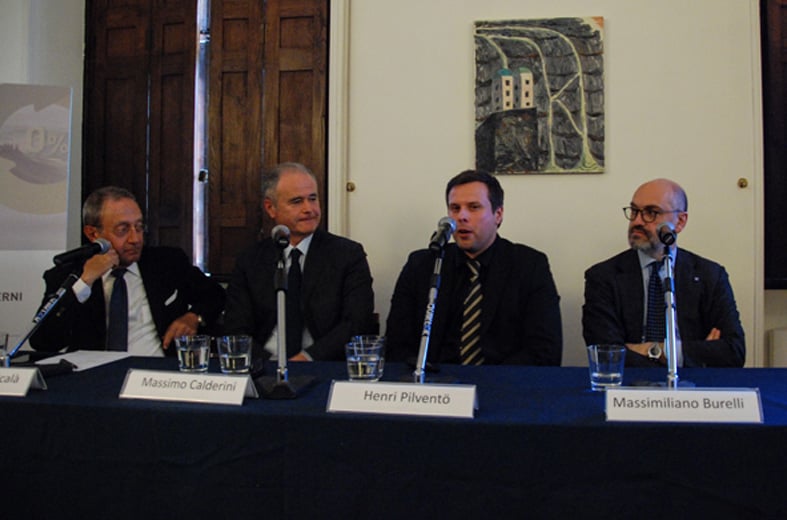
Henri Pilventö, Chief Commercial Officer of Tapojärvi (second on the right), presented a joint venture with Acciai Speciali Terni (AST) at the residence of the Finnish ambassador in Rome. AST managers Antonio Catracalà (left), Massimo Calderini and Massimiliano Burelli joined in.
The mining sector service company Tapojärvi, specialising in industrial processes and the treatment of materials, is launching the company’s largest international project so far in Terni, Italy. Terni, located just over 100 km from Rome, is home to one of the most prominent steel mills in Italy, Acciai Speciali Terni (AST). Tapojärvi is building a valorisation in Terni to manufacture CE-marked products from the slag generated as a by-product of steel production.
"Tapojärvi's expertise in the circular economy and the most efficient and environmentally friendly deployment of materials generated as by-products of industrial processes is the starting point for this joint project," says AST CEO Massimiliano Burelli.
"The goal is for Terni to play a key role in the processing of industrial by-products," Burelli continues.
After the completion of the slag treatment plant, the slag that used to be disposed of as waste will now be used in the manufacture of asphalt and cement, for example.
"Our trump card is the highest possible metal recovery from slag. We are one of the best in the world at that and, as a result, slag can be used to make multi-purpose materials," says Henri Pilventö, the Chief Commercial Officer of Tapojärvi.
Burelli and Pilventö presented the joint project "Rifiuti Zero" or "Zero Waste" at the Finnish Embassy in Rome on Tuesday.
Today, the planning of the slag treatment plant is in full swing in Terni, and project managers from Tapojärvi have been living in Italy since October last year.
"Complete cultural immersion is under way here and there is a fair number of Tapojärvi people in Terni already. We are currently recruiting to find the best Italian experts to build the valorisation plant, "says Mari Pilventö, acting CEO of Tapojärvi.
Burelli and Pilventö presented the joint project "Rifiuti Zero" or "Zero Waste" at the Finnish Embassy in Rome on Tuesday.
Today, the planning of the slag treatment plant is in full swing in Terni, and project managers from Tapojärvi have been living in Italy since October last year.
"Complete cultural immersion is under way here and there is a fair number of Tapojärvi people in Terni already. We are currently recruiting to find the best Italian experts to build the valorisation plant, "says Mari Pilventö, acting CEO of Tapojärvi.
Italians will mainly be in charge of the practical construction work, but we will have know-how and project management from Tornio on site in Terni from the laying of the foundation stone to the inauguration of the slag treatment plant. The inauguration is scheduled to take place in about two years.
"Our cooperation with the Italians is off to a great start and the people are really helpful and nice. Of course, there have been the odd cultural collision here and there, such as meal times. Food is not always available here, only at the Italian lunch and dinner times, "says Pilventö.
Tapojärvi Oy is a company specialising in mining industry services and industrial processes as well as the treatment of materials. The company has two unique valorisation plants in Tornio, where they productise by-products of ferrochrome and stainless steel slag into their own CE-marked products. Tapojärvi employs more than 450 people, and around 60 people are employed by subcontractors.
Acciai Speciali Terni is a subsidiary of the German industrial conglomerate ThyssenKrupp. ThyssenKrupp is one of the largest steel producers in the world.
INFO
The cooperation agreement promotes the circular economy.
Circular economy innovations save natural resources.
The production of aggregates from virgin raw materials is significantly reduced.
Efficient use of materials is ecological.
Cost savings are achieved through the efficient use of materials.

